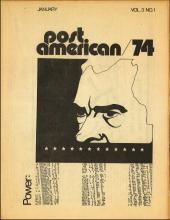Popular American mythology holds that power in this society is rooted in the sovereign people. This concept runs through American history. It is probably most often found today in ninth grade civics classes and in the speeches of aspiring politicians. This sovereign power is exercised by people coming together and discussing their common problems. Interest groups of various sorts are formed, which have a voice in the political process. The political process is seen as these interest groups coming together and forming coalitions and counter-coalitions, with the will of the majority ruling in the interests of all.
More realistic is the commonly heard assertion, "You can't fight City Hall." Many Americans, perhaps now a majority according to recent polls, believe that individuals have no voice in the decisions that ultimately affect their daily lives. The resulting apathy, exemplified by the large numbers who do not bother to vote, is more prominent than ever since Watergate. People are openly expressing the belief that all politicians are corrupt; consequently, why bother to get involved?
However true the belief in universal political corruption is, it profoundly misses the point about the way power is exercised in American society because it sees the source of power residing ultimately in the political process. This question of the structure of power is a crucial one, because it significantly affects the way Christians live out their lives in the world, corporately and individually.
THE POWER ELITE
Read the Full Article
